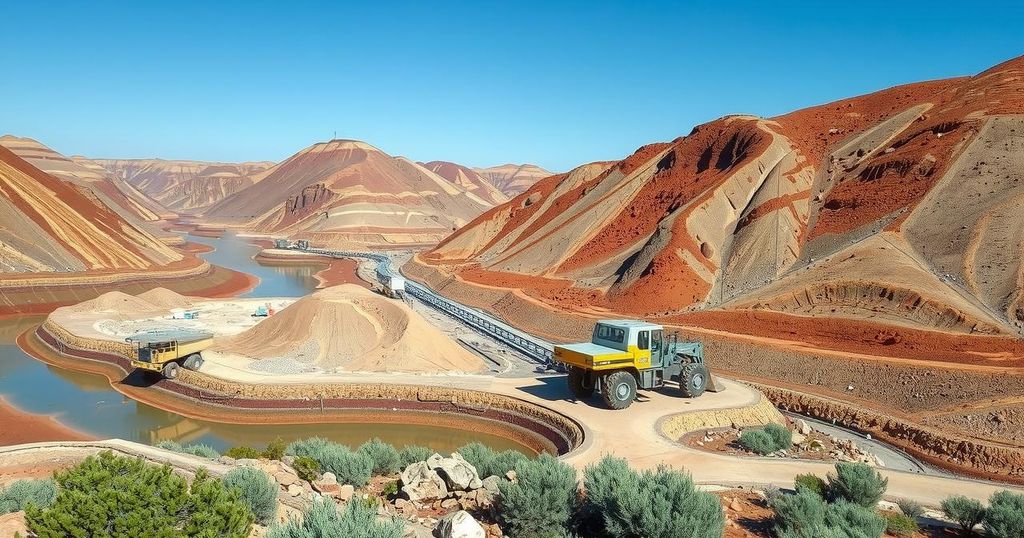France’s Orano Mining has partnered with Uzbekistan’s Navoiuran and Japan’s ITOCHU to initiate uranium extraction at the Jongeldy deposit, following the loss of its assets in Niger. The agreement involves a $214 million investment to enhance uranium production and attract foreign investment, solidifying Uzbekistan’s position in the global market.
France’s Orano Mining, along with Uzbekistan’s Navoiuran and Japan’s ITOCHU, has solidified a groundbreaking trilateral agreement for uranium extraction at the Jongeldy deposit. Signed on March 10, 2025, in Paris, this accord not only initiates the deposit’s development but also accelerates geological exploration within other joint ventures, significantly enhancing Uzbekistan’s uranium sector.
Uzbekistan stands as one of the top five global producers of uranium, and partnerships with prominent companies such as Orano Mining and ITOCHU will potentially fortify the country’s position in this essential industry. This agreement lays the groundwork for expanding uranium mining, elevating production volumes, and attracting foreign investments, thereby revitalizing Uzbekistan’s economic landscape.
The initial phase of developing the Jongeldy deposit is projected to require an investment of $214 million over three years, with foreign companies as principal investors. Navoiuran will act as the project operator, streamlining production costs and facilitating the integration of mining operations into existing infrastructure. Average annual uranium production is expected to reach 500 tonnes, with peak output at South Jongeldy potentially hitting 700 tonnes annually.
A joint venture named Nurlikum Mining will be formed to oversee the project’s implementation, with ITOCHU acquiring a stake. The project’s international collaboration increases its attractiveness to investors, highlighting its global significance.
This strategic move by Orano Mining follows the loss of its mining assets in Niger, as leadership changes prompted Niger’s Minister of Mines, U. Abarshi, to indicate that French companies are unlikely to recover their uranium mining rights. Consequently, Orano is redirecting its focus towards alternative production sources in regions such as Uzbekistan, Kazakhstan, Mongolia, Namibia, and Canada.
In 2022, Niger accounted for approximately 3.47% of global uranium production, ranking seventh worldwide, with Orano extracting around 1,200 tonnes from this African nation. The loss of these assets has made Central Asian ventures crucial to Orano’s strategy moving forward.
The Jongeldy project aligns with a comprehensive cooperation program started in 2022, following a strategic framework agreement between Orano and the Uzbek government. Recently, Uzbekistan’s President Shavkat Mirziyoyev and Orano Chairwoman Claude Imauven reaffirmed their commitment to enhancing collaboration in uranium exploration and extraction.
In addition to its endeavors in Uzbekistan, Orano Mining is also expanding its activities in other regions. For instance, in December 2024, a preliminary agreement was signed with Mongolia to develop the Zoovch-Ovoo deposit. Moreover, CEO Nicolas Maes has unveiled intentions for a small-scale mining operation in Uzbekistan, reflecting the company’s proactive approach in diversifying its portfolios in various countries.
The trilateral agreement signifies a pivotal advancement in Uzbekistan’s uranium industry and will bolster not only uranium production but also the country’s standing in the global market. Amid geopolitical transformations and France’s diminished assets in Africa, Uzbekistan is poised to become a strategic ally for Orano, while Japan looks to secure stable uranium supplies through this collaboration.
The trilateral agreement between France’s Orano Mining, Uzbekistan’s Navoiuran, and Japan’s ITOCHU marks a significant shift in the uranium mining sector, particularly for Uzbekistan. The initiative not only aims to boost uranium production but also strengthens global ties amidst France’s struggles in Africa. With major investments and a focus on international partnerships, the future of Uzbekistan’s uranium industry appears promising, paving the way for increased cooperation and further developments in the sector.
Original Source: news.az




